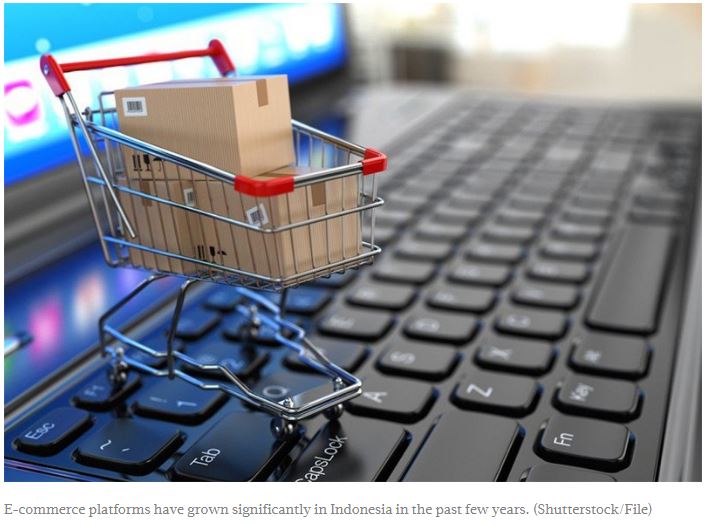Indonesia: Restrictions curb digital economy growth: Experts
Indonesia’s digital economy has soared over the past five years, but the government’s restrictions on investment and innovation could stifle growth, experts have warned.
The country’s digital economy is projected to triple to US$100 billion by 2025, however Indonesia remains the fourth most restrictive country for digital trade out of 64 countries surveyed by the European Centre for International Political Economy (ECIPE).
Indonesia’s level of restrictiveness is topped only by China, Russia and India according the ECIPE Digital Restrictiveness Index.
“This biggest [factor that creates] economic impact is productivity, so the economies that stand to receive the biggest boost from relaxing regulations are these most restrictive countries,” said ECIPE director Hosuk Lee-Makiyama in a discussion in Jakarta recently.
In its 2018 report, the ECIPE highlighted two policies that curb the growth potential of Indonesia’s digital economy: the restriction on foreign ownership in e-commerce businesses – which contribute 45 percent of the digital economy – and the requirement for companies to build data centers in Indonesia.
According to the prevailing regulation, foreign investors are only allowed to own up to 99 percent of shares in e-commerce businesses with valuations that exceed Rp 100 billion (US$7.07 million).
Foreign investors can also hold a maximum of 49 percent of shares in e-commerce companies with valuations between Rp 10 billion and Rp 100 billion.
However, e-commerce businesses with valuations below Rp 10 billion are still off limits to foreign investment.
Coordinating Economic Minister Darmin Nasution was close to relaxing the restriction in November last year when he launched the 16th Economic Policy Package, which includes a plan to allow foreign direct investment into 54 economic sectors including e-commerce businesses.
However, the Indonesian Chamber of Commerce and Industry (Kadin), backed by several business associations, pressured the government to revise the plan and President Joko “Jokowi” Widodo finally cancelled it in late November.
But not all Indonesian businesspeople oppose foreign ownership. Entrepreneur Edward Ismawan Chamdani, founder of venture capital firm Ideosource, expressed disagreement with such restrictions in Indonesia.
“We have a pool of investors, especially for start-ups, but we don’t have enough incentives, especially tax incentives,” he said.
The growing pool of investors in Indonesia is shown in data from the Emerging Market Private Equity Association (EMPEA), which shows that venture capital investments in the country skyrocketed from $2.3 million in 2014 to $136 million in 2017.
Edward recommended that the government should reduce capital gains tax, which goes as high as 30 percent for individuals and 25 percent for corporations in Indonesia.
Meanwhile, Semuel Abrijani Pangerapan, the Communications and Information Ministry’s information applications director general, attempted to revoke the requirement on data center localization last year in order to help companies – especially technology startups – reduce IT infrastructure costs.
The data center requirement is mandated under Article 7 of Government Regulation No. 82/2012 on the management of electronic transactions and systems.
Semuel, however, met heavy resistance from the Indonesian Information and Telecommunications Society (Mastel), which argued Indonesia still needed the requirement to protect internet users.
“Relaxing the localization requirement will be detrimental for Indonesians because we do not have an alternative data protection law,” said Mastel chairman Kristiono.
Makiyama explained that the data localization requirement was actually a common government approach to cybersecurity, but that it was insufficient without other measures including public awareness about “digital hygiene” practices, such as regularly changing passwords, and active cyber defense protocols.
He also concurred with Kristiono on the need for a data protection law before undoing data localization. Both a data protection law and the revocation on data localization are required under the Comprehensive and Progressive Agreement for Trans-Pacific Partnership (CPTPP), to which Indonesia is not a signatory.
Using the CPTPP as a benchmark for an open internet policy, Makiyama calculated that Indonesia could boost its gross domestic product by 1 percent, which would equal a $10 billion increase, if it relaxed its digital trade regulations to a level seen in the regional agreement.
Source: https://www.thejakartapost.com/news/2019/02/18/restrictions-curb-digital-economy-growth-experts.html


 Thailand
Thailand




